Pipe up on June 12 to salute heroes of St Valéry
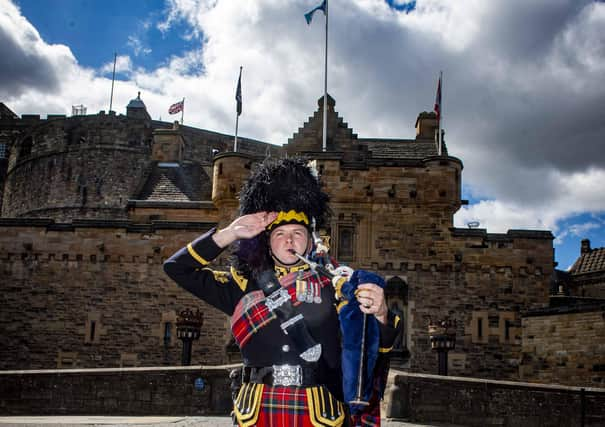

His dad was working in the fields and didn’t see his son in a sea of Cameron Highlanders heading on that fateful journey to France.
Many would never see home again; for Jack, then 21, it would be five long years.
Advertisement
Hide AdAdvertisement
Hide AdHe was among the heroes of St Valéry. Largely comprised of men from the 51st Highland Division, they fought almost continuously for ten days against overwhelming odds.
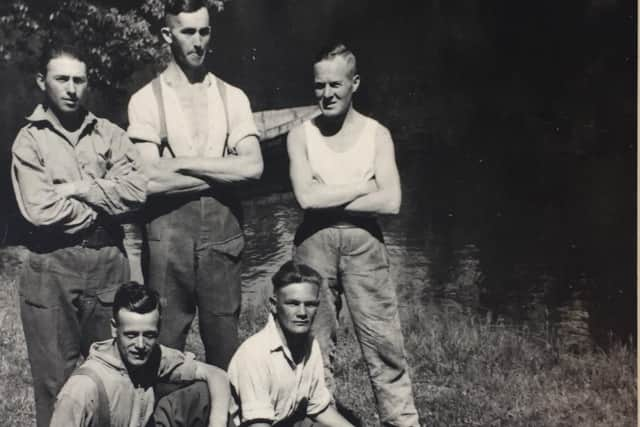

Eventually surrounded by the Germans at St Valéry, those who were not killed or fell to their deaths from the cliffs trying to escape were captured on June 12, 1940.
Marched hundreds of miles to Prisoner of War camps in eastern Europe, they endured appalling conditions for five long years.
Jack survived thanks to the comradeship of his fellow POWs and being able to escape the confines of his prison by writing poetry.
Advertisement
Hide AdAdvertisement
Hide AdNow, some 80 years since he penned those poems, a much wider audience will be able to enjoy them.
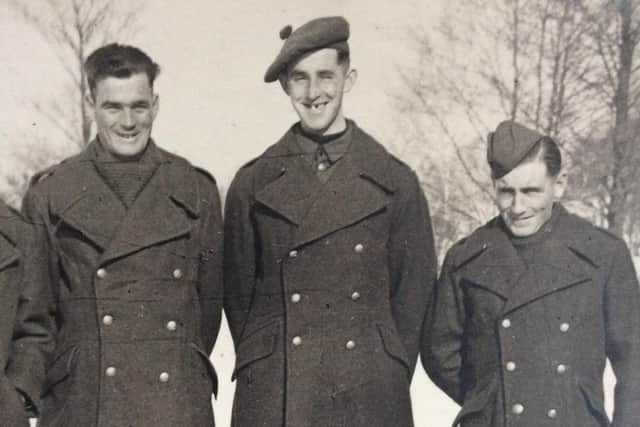

For Jack’s story, recorded for his grandsons, Jack jnr (30) and Conall (27), when they were small, will form part of the 80th anniversary commemorations of the heroes of St Valéry.
Pipers and musicians across Scotland – and the globe – are also being invited to join a poignant tribute to thousands of Scots who were killed or captured during “the forgotten Dunkirk”.
The lesser-known battle of Saint-Valéry-en-Caux is being memorialised this year by Legion Scotland, Poppyscotland and RCET: Scotland’s Armed Forces Children’s Charity.
Advertisement
Hide AdAdvertisement
Hide AdThey have joined forces to organise the tribute, which will include online learning resources, virtual tributes and a fundraising campaign.
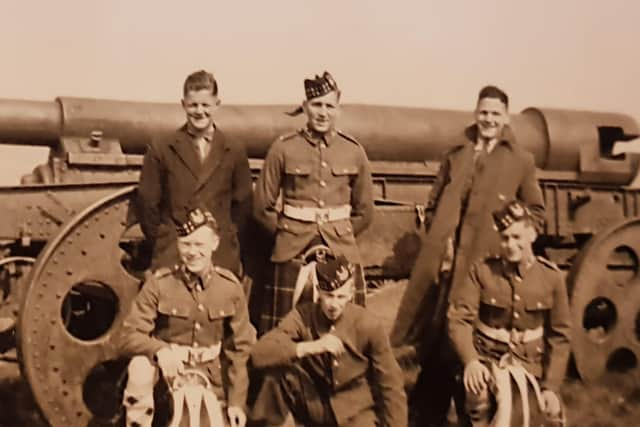

Almost 300 pipers from 17 countries on five continents have already pledged to take to their doorsteps at 10am on Friday, June 12, to play the haunting pipers march, Heroes of St Valéry.
Among their number are serving soldiers, both in Afghanistan and closer to home, and Willie Armstrong, one of the founding members of The Red Hot Chilli Pipers.
And it’s all happening largely thanks to Jack’s son John, who has lobbbied unsuccessfully for years to ensure his dad and comrades are suitably remembered.
Advertisement
Hide AdAdvertisement
Hide AdA former head teacher who lives in Pitlochry, John retired in 2013 then worked for five years as policy officer for the John Muir Trust.
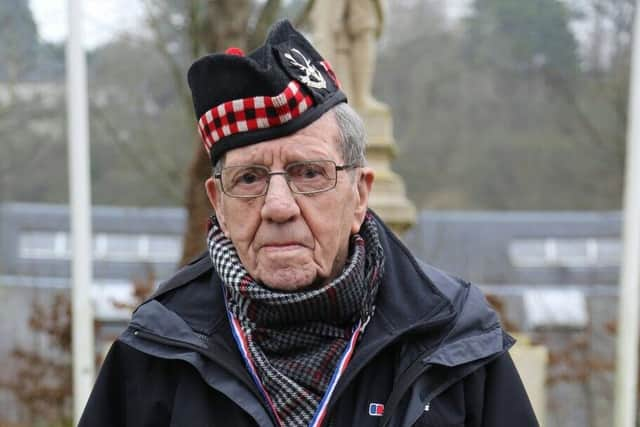

Having been unable to muster support for an event for the 75th anniversary, John was determined the 80th would serve as a tribute to the men of St Valéry.
So he contacted his friend Neil McLennan, a historian who works at Aberdeen University, and together they hatched a plan.
Sadly, Covid-19 then reared its ugly head.
John (66) said: “Hardly a word has ever been said about the men of St Valéry.
Advertisement
Hide AdAdvertisement
Hide Ad“For the 75th, I tried to get the Scottish and UK governments interested but nothing happened. So for the 80th I was determined they would be remembered.
“I contacted the Scottish Government and was told if I organised something, they’d be happy to attend.
“Then Covid-19 began and it was obvious nothing was going to happen.
“However, I contacted Neil and showed him my father’s poems and played him his life story, which dad recorded for the boys.
Advertisement
Hide AdAdvertisement
Hide Ad“Neil suggested we could get musicians to play the Heroes of St Valéry.
“We got in touch with Poppyscotland and it just snowballed from there.
“Donald Cameron, the Highlands and Islands MSP, has now tabled a motion for us in the Scottish Parliament, recognising the heroes of St Valéry.
“Sadly, only 25 of his fellow MSPs have signed the motion but, hopefully, more will now get on board.
Advertisement
Hide AdAdvertisement
Hide Ad“I know Stuart McMillan MSP is planning to play the pipes on his doorstep too.”
The tribute is long overdue but John is happy his dad and eldest son Jack jnr will also be taking centre stage. For both Jacks will be reciting two poems written in the confines of a Polish prisoner of war camp.
John explained: “Dad recorded two of his poems, St Valéry, June 12th, 1940 and Poem Without a Title, which reflects on his time in the camp.
“It’s about setting his mind free, meeting his old pals and being told to hold the flag up for them.
Advertisement
Hide AdAdvertisement
Hide Ad“For a ploughman who left school at the age of 14, they are very well written and extremely touching.
“It’s nice for us to know that dad will be a part of the commemorations.”
Jack died in November 2004 but his memories of life in a German prisoner of war camp were not lost, thanks to the recordings he made for his grandsons.
The treasured cassettes tell his life story, from being born in a snowstorm in Ladybank, Fife, in 1919 through to the 1960s working as a police officer in Perth.
Advertisement
Hide AdAdvertisement
Hide AdThey were recorded while Jack tended to his wife Janet “Jen” Adams, a Red Cross nurse who helped him recover in Bridge of Earn Hospital when he was finally repatriated in 1944 with TB.
They married in 1946, had two children, Evelyn and John, and went on to have a very happy life indeed.
“Dad was a shadow of himself when he returned, really gaunt and missing teeth,” said John. “But they fell in love, were a devoted couple and had a great life.
“Mum lost her eldest brother at the end of World War One and her youngest brother in Syria in 1941. But they put all that behind them and just got on with it.”
Advertisement
Hide AdAdvertisement
Hide AdHowever, Jack never forgot Stalag 21D, the comrades he lost and those who helped him survive.
John said: “Dad wasn’t a big TV watcher or reader so when he was caring for mum. who had dementia, we bought him a tape recorder and cassette tapes and said he should record his story.
“He was a great storyteller and the boys loved listening to his stories; they were still young when he passed away.
“At least we have these recordings; it’s a lot more than most people have.”
Advertisement
Hide AdAdvertisement
Hide AdThe recordings tell a wealth of stories, from foraging in bins for scraps to constructing a radio.
“When the men had toothache they were taken to the dentist in Poznan, who gave them small parts of a radio,” said John.
“Eventually, they were able to smuggle all the parts into the camp and tuned into the BBC World Service.
“When the Allies won at Alamein, all of the guys came out of their huts cheering.
Advertisement
Hide AdAdvertisement
Hide Ad“The Germans hadn’t yet heard so they realised there was a radio in camp – but they never did find it. After that, the RSM made sure the news had a two week delay!
“The thing that comes through in the recordings most though is how they all looked after each other.
“They worked in fields and factories during the day but were there for each other, foraging for sausages scraped off the German officers’ plates or stealing food from fields to survive.”
One of the most incredible stories is that of Australian surgeon, Colonel Le Souf, who operated on Jack’s back when he was a POW so he could still work.
Advertisement
Hide AdAdvertisement
Hide AdYears later, working as a police officer in Perth, he met an Australian couple who knew the Colonel.
John added: “Dad had retired when he received a letter a couple of years later, via the chief constable, from Colonel Le Souf.
“The surgeon had never heard from any man he had operated on in the camp, until he learned about dad.
“It was an incredible story but just one of many recorded on those tapes.”
Advertisement
Hide AdAdvertisement
Hide AdNow, Jack’s story and that of his comrades will finally be celebrated on June 12 by pipers and musicians all over the world.
Neil McLennan, convenor of the St Valéry commemorations, said: “There are pipers signed up from as far afield as Peru and Singapore, with scores more joining every day.
“The world record for the largest ever piping ensemble saw 333 participants at an event in Bulgaria in 2012.
“Due to the pandemic this will be a virtual event but, given the interest, our hope is it will be the largest mass playing of the pipes ever.
Advertisement
Hide AdAdvertisement
Hide Ad“The events at St Valéry in 1940 have never received the level of recognition we believe they should have but this year’s commemoration will ensure the Forgotten 51st are forgotten no more.”
To register and access the sheet music visit www.poppyscotland.org.uk/st-valery. For more information on the 51st (Highland) Division at St Valéry visit https://51hd.co.uk.
Donald was just 18 when he was captured
Donald Smith joined the Territorials aged 16, and in 1938, joined the Seaforth Highlanders, signing up with friends from school in Leeds.
While training at Fort George in 1939, Donald took a photograph of them at the side of a German gun captured in the First World War. Sadly, none of his friends in that photo ever came home.
Advertisement
Hide AdAdvertisement
Hide AdAs part of the 4th Battalion Seaforth Highlanders, Donald was on a Bren gun holding the perimeter around St-Valéry-en-Caux at Veules-les-Roses. A shell explosion killed two of his friends either side of him.
Donald was severely wounded and made his way into the town of St Valéry where he passed out from blood loss and was captured by the Germans.
Aged just 18 years old, a German officer asked him how old he was. He responded: “Old enough to fight you b******s!”
After some time in a hospital, Donald was held as a Prisoner of War at Stalag VIII-B Lamsdorf in Poland. He took part in the notorious death march at the end of the war. His four-month-long march ended after being released by the Americans.
Advertisement
Hide AdAdvertisement
Hide AdWhen health allows, Donald goes to the Cenotaph in November to pay tribute to the friends he lost.
And in 2018, he returned to St Valéry as part of a Channel 4 documentary on the 51st.
On hearing about the plans for the tribute on June 12, Donald, who will be celebrating his 100th birthday on October 3, said: “I think it’s a great tribute to the boys that were left behind.
“It’s nice to think that somebody is taking an interest after so much time has passed.
Advertisement
Hide AdAdvertisement
Hide Ad“It makes my day to hear the pipers. I think it’s wonderful.”
Donald moved to Scotland to live with his wife Helen after he retired. The couple have three children, four grandchildren and two great grandchildren.
On June 12, a piper from Forres Pipe Band will play outside the couple’s home. Several members played on Donald’s 99th birthday and the band have pledged to return for his 100th.